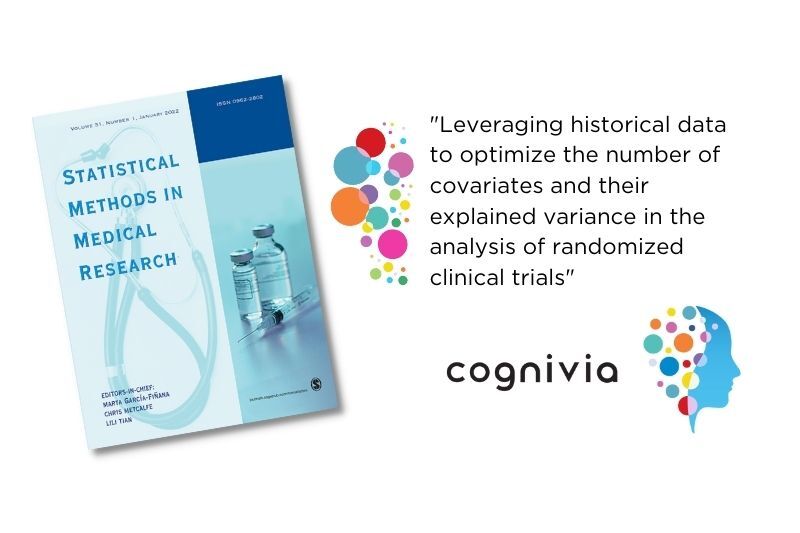Case study: The placebo response
Analysis of clinical trial data faces multiple pressures: the amount and complexity of data is growing while the pressure to minimize sample size to save cost and timeline remains. At the same time, new approaches are emerging to address highly complex phenomena – like the placebo response. A recent Cognivia publication in Statistical Methods in Medical Research explores the use of composite covariates to address these issues.
Covariates are typically used to control for factors that may impact the measurement of outcomes, particularly to describe individual patient characteristics that may or may not relate to treatment response. In fact, all patient baseline characteristics collected are potential covariates linked with the patient’s outcome. As a paradox, having access to more and more informative baseline patient data, and from different domains, could result in a downside and not an advantage if not properly used.
In general, covariate use is an effective way to explain the variability of the patients’ response and improve the studypower when assessing treatment efficacy. Including covariates in the analysis of study outcomes could greatly improve the efficiency and power of the trial1. In fact, the approach is covered by regulatory guidance issued by the FDA and EMA.
However, there is such thing as too many covariates, which increases the risk that they will actually become confounding factors with an opposite intended effect. That’s why it’s recommended to select the fewest number of covariates that have a strong association with the RCT outcome. One can also use a composite covariate – a variable made up of two or more variables that are highly related – to reduce the risk of overfitting.
This approach was described in “Leveraging historical data to optimize the number of covariates and their explained variance in the analysis of randomized clinical trials”, co-authored by Cognivia authors Samuel Branders, PhD, Alvaro Pereira, PhD and Guillaume Bernard, PhD, was recently published in Statistical Methods in Medical Research2. This composite covariate approach was developed with to goal of accounting for individual patients’ placebo responsiveness in a clinical trial population as a new approach to reduce the negative impact of the placebo response on data analysis. In osteoarthritis (OA) and, more generally, chronic pain, the magnitude and variability of the placebo response often obscures the superiority of active compounds compared to the placebo3–5, making it difficult to determine efficacy and leading to phase II and III trial failures. Recently, studies have found that many patients’ baseline characteristics are associated with the placebo response6–9. However, controlling for the placebo response in the statistical analysis has proven difficult, and using every baseline characteristic as an individual covariate to target the placebo response would risk creating confounding factors. The complex and highly multifaceted nature of the placebo effect phenomenon – and the patient characteristics that relate to it – would benefit greatly from a composite covariate approach.
To investigate this concept, a composite covariate – generated through the combination of patient psychology data and a well-trained, predictive machine learning model – was applied in a phase II randomized, placebo-controlled clinical trial testing the efficacy of a single-dose intra-articular injection in patients suffering from painful OA of the knee10,11 . This covariate was fit using data from four previous clinical trials in chronic pain.
The composite covariate relating to each patient’s predicted placebo response was indeed highly correlated (r = 0.60,p < 0.001) with the observed placebo response (primary endpoint in placebo-treated patients), confirming thepredictive performance of the model. When used in the estimation of the treatment effect comparing the placebo and active arms, the estimated variance of the average treatment effect decreased by 26.8%. This study demonstrates the power of the composite covariate approach for understanding complex phenomena like the placebo response and serves as the basis of the Placebell©™ method. In cases and indications where clinical trial data are available, along with key psychological data (typically collected using the MPsQ questionnaire), a composite covariate can be fit to explain data variability related to the range of placebo responsiveness in a diverse clinical trial population. As with all covariates, this is an efficient way to improve study power and reduce the risk of clinical trial failure.
Read more about the research here.
References:
- Egbewale BE, Lewis M, Sim J. Bias, precision and statistical power of analysis of covariance in the analysis of randomized trials with baseline imbalance: A simulation study. BMC Medical Research Methodology. 2014;14(1):1-12. doi:10.1186/1471-2288-14-49/COMMENTS
- Branders S, Pereira A, Bernard G, Ernst M, Dananberg J, Albert A. Leveraging historical data to optimize the number of covariates and their explained variance in the analysis of randomized clinical trials.: https://doi.org/101177/09622802211065246. Published online December 13, 2021:096228022110652. doi:10.1177/09622802211065246
- Previtali D, Merli G, di Laura Frattura G, Candrian C, Zaffagnini S, Filardo G. The Long-Lasting Effects of “Placebo Injections” in Knee Osteoarthritis: A Meta-Analysis. Cartilage. Published online 2020. doi:10.1177/1947603520906597
- Tuttle AH, Tohyama S, Ramsay T, et al. Increasing placebo responses over time in U.S. clinical trials of neuropathic pain. Pain. 2015;156(12):2616-2626. doi:10.1097/j.pain.0000000000000333
- Enck P, Bingel U, Schedlowski M, Rief W. The placebo response in medicine: minimize, maximize or personalize? Nature reviews Drug discovery. 2013;12(3):191-204. doi:10.1038/nrd3923
- Horing B, Weimer K, Muth ER, Enck P. Prediction of placebo responses: a systematic review of the literature. Frontiers in psychology. 2014;5(October):1079. doi:10.3389/fpsyg.2014.01079
- Vachon-Presseau E, Berger SE, Abdullah TB, et al. Brain and psychological determinants of placebo pill response in chronic pain patients. Nature Communications. 2018;9(1):1-15. doi:10.1038/s41467-018-05859-1

